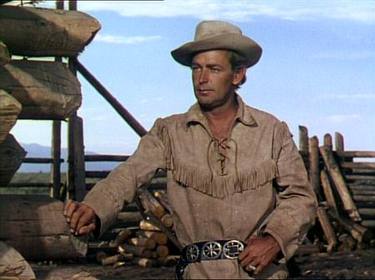It’s a sad fact of life that from the day you first set foot in playschool to the time you retire and the firm presents you with a gold-plated iPad you will almost certainly encounter that most malevolent of figures: the bully.
We are in Wyoming – the nearest lawman is 100 miles ride away – three days. This is George Stevens’ remarkably affecting Western Shane. A family of homesteaders, the Starrets (played by Van Heflin, Jean Arthur and their son Brandon de Wilde) and their neighbours are threatened by no-good cattlemen who will stop at nothing to reclaim the land the settlers have worked so hard to cultivate. Then, riding in from the range, comes a mysterious stranger in the form of Shane (the winsome Alan Ladd, the DiCaprio of his day).
The action unfolds in the lee of the Grand Tetons mountain range (more Rockies than the Rockies). This majestic backdrop makes the people seem all the more insignificant and their struggle all the more unendurable. It is Shane’s job to ensure that right prevails and the farmers don’t give in to the cowboys and their hired gun (the vulpine Jack Palance). There’s a subplot of lost innocence with the farmer’s boy idolising the saintly outsider. And there’s a vast biblical sweep to the storytelling – from its almost surreally impressive setting (cinematographer Loyal Griggs won an Oscar) to the achingly heart-rending score by Victor Young.
Palance is the embodiment of evil – even the saloon dog slinks away when he appears. The legend goes that during World War II George Stevens was utterly changed when his battalion entered Dachau concentration camp. Thereafter his movies became darker (and more bombastic) but Shane is undoubtedly his best movie and, for that matter, Ladd’s. The barroom brawl is particularly convincing and the shootouts also have a shocking realism. The movie hugely influenced Cimino, Tarantino and Eastwood. The latter’s Pale Rider was a remake of Shane.
It’s long been said that this is the western for people who don’t like westerns. Shane has its flaws – some viewers might find it grandiose and maudlin and the boy can be overly mewling at times but look beyond the surface and it’s an existential epic on loss (the loss of face, the loss of dignity, as well as the loss of home) and the struggle of good and evil; a struggle that’s rarely equal. It’s also a story of standing your ground, helping others to defeat all-powerful bullies or giving up everything and letting the bad guys win. In today’s political climate it’s a story that’s more relevant than ever.
